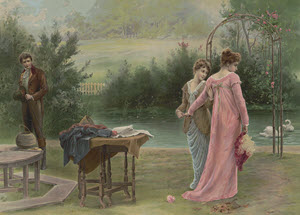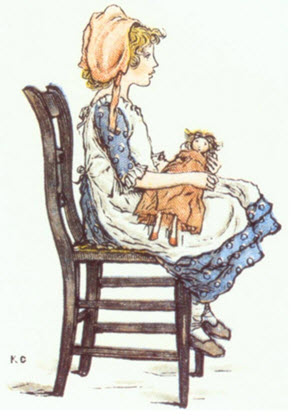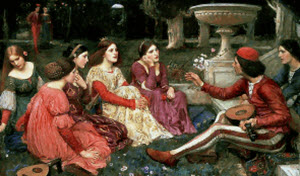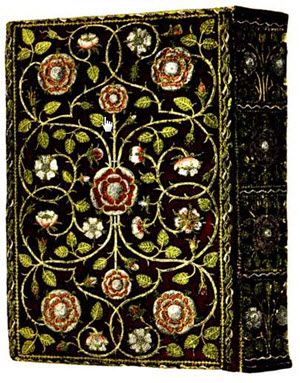OLD ENGLISH POETRY
by Edgar Allan PoeIT should not be doubted that at least one-third of the affection with
which we regard the elder poets of Great Britain should be-attributed to
what is, in itself, a thing apart from poetry-we mean to the simple love
of the antique-and that, again, a third of even the proper _poetic
sentiment inspired _by their writings should be ascribed to a fact
which, while it has strict connection with poetry in the abstract, and
with the old British poems themselves, should not be looked upon as a
merit appertaining to the authors of the poems. Almost every devout
admirer of the old bards, if demanded his opinion of their productions,
would mention vaguely, yet with perfect sincerity, a sense of dreamy,
wild, indefinite, and he would perhaps say, indefinable delight; on being
required to point out the source of this so shadowy pleasure, he would be
apt to speak of the quaint in phraseology and in general handling. This
quaintness is, in fact, a very powerful adjunct to ideality, but in the
case in question it arises independently of the author's will, and is
altogether apart from his intention. Words and their rhythm have varied.
Verses which affect us to-day with a vivid delight, and which delight, in
many instances, may be traced to the one source, quaintness, must have
worn in the days of their construction, a very commonplace air. This is,
of course, no argument against the poems now-we mean it only as against
the poets _thew. _There is a growing desire to overrate them. The old
English muse was frank, guileless, sincere, and although very learned,
still learned without art. No general error evinces a more thorough
confusion of ideas than the error of supposing Donne and Cowley
metaphysical in the sense wherein Wordsworth and Coleridge are so. With
the two former ethics were the end-with the two latter the means. The poet
of the "Creation" wished, by highly artificial verse, to inculcate what he
supposed to be moral truth-the poet of the "Ancient Mariner" to infuse the
Poetic Sentiment through channels suggested by analysis. The one finished
by complete failure what he commenced in the grossest misconception; the
other, by a path which could not possibly lead him astray, arrived at a
triumph which is not the less glorious because hidden from the profane
eyes of the multitude. But in this view even the "metaphysical verse" of
Cowley is but evidence of the simplicity and single-heartedness of the
man. And he was in this but a type of his school-for we may as well
designate in this way the entire class of writers whose poems are bound up
in the volume before us, and throughout all of whom there runs a very
perceptible general character. They used little art in composition. Their
writings sprang immediately from the soul-and partook intensely of that
soul's nature. Nor is it difficult to perceive the tendency of this
_abandon-to elevate _immeasurably all the energies of mind-but, again, so
to mingle the greatest possible fire, force, delicacy, and all good
things, with the lowest possible bathos, baldness, and imbecility, as to
render it not a matter of doubt that the average results of mind in such a
school will be found inferior to those results in one _(ceteris _paribus)
more artificial.
We can not bring ourselves to believe that the selections of the "Book of
Gems" are such as will impart to a poetical reader the clearest possible
idea of the beauty of the school-but if the intention had been merely to
show the school's character, the attempt might have been considered
successful in the highest degree. There are long passages now before us of
the most despicable trash, with no merit whatever beyond that of their
antiquity.. The criticisms of the editor do not particularly please us.
His enthusiasm is too general and too vivid not to be false. His opinion,
for example, of Sir Henry Wotton's "Verses on the Queen of Bohemia"-that
"there are few finer things in our language," is untenable and absurd.
In such lines we can perceive not one of those higher attributes of Poesy
which belong to her in all circumstances and throughout all time. Here
every thing is art, nakedly, or but awkwardly concealed. No prepossession
for the mere antique (and in this case we can imagine no other
prepossession) should induce us to dignify with the sacred name of poetry,
a series, such as this, of elaborate and threadbare compliments, stitched,
apparently, together, without fancy, without plausibility, and without
even an attempt at adaptation.
In common with all the world, we have been much delighted with "The
Shepherd's Hunting" by Withers--a poem partaking, in a remarkable degree,
of the peculiarities of "Il Penseroso." Speaking of Poesy the author says:
"By the murmur of a spring,
Or the least boughs rustleling,
By a daisy whose leaves spread,
Shut when Titan goes to bed,
Or a shady bush or tree,
She could more infuse in me
Than all Nature's beauties can
In some other wiser man.
By her help I also now
Make this churlish place allow
Something that may sweeten gladness
In the very gall of sadness--
The dull loneness, the black shade,
That these hanging vaults have made
The strange music of the waves
Beating on these hollow caves,
This black den which rocks emboss,
Overgrown with eldest moss,
The rude portals that give light
More to terror than delight,
This my chamber of neglect
Walled about with disrespect;
From all these and this dull air
A fit object for despair,
She hath taught me by her might
To draw comfort and delight."
But these lines, however good, do not bear with them much of the general
character of the English antique. Something more of this will be found in
Corbet's "Farewell to the Fairies!" We copy a portion of Marvell's "Maiden
lamenting for her Fawn," which we prefer-not only as a specimen of the
elder poets, but in itself as a beautiful poem, abounding in pathos,
exquisitely delicate imagination and truthfulness-to anything of its
species:
"It is a wondrous thing how fleet
'Twas on those little silver feet,
With what a pretty skipping grace
It oft would challenge me the race,
And when't had left me far away
'Twould stay, and run again, and stay;
For it was nimbler much than hinds,
And trod as if on the four winds.
I have a garden of my own,
But so with roses overgrown,
And lilies, that you would it guess
To be a little wilderness;
And all the spring-time of the year
It only loved to be there.
Among the beds of lilies I
Have sought it oft where it should lie,
Yet could not, till itself would rise,
Find it, although before mine eyes.
For in the flaxen lilies' shade
It like a bank of lilies laid;
Upon the roses it would feed
Until its lips even seemed to bleed,
And then to me 'twould boldly trip,
And print those roses on my lip,
But all its chief delight was still
With roses thus itself to fill,
And its pure virgin limbs to fold
In whitest sheets of lilies cold.
Had it lived long, it would have been
Lilies without, roses within."
How truthful an air of lamentations hangs here upon every syllable! It
pervades all.. It comes over the sweet melody of the words-over the
gentleness and grace which we fancy in the little maiden herself-even over
the half-playful, half-petulant air with which she lingers on the beauties
and good qualities of her favorite-like the cool shadow of a summer cloud
over a bed of lilies and violets, "and all sweet flowers." The whole is
redolent with poetry of a very lofty order. Every line is an idea
conveying either the beauty and playfulness of the fawn, or the
artlessness of the maiden, or her love, or her admiration, or her grief,
or the fragrance and warmth and _appropriateness _of the little nest-like
bed of lilies and roses which the fawn devoured as it lay upon them, and
could scarcely be distinguished from them by the once happy little damsel
who went to seek her pet with an arch and rosy smile on her face. Consider
the great variety of truthful and delicate thought in the few lines we
have quotedthe _wonder _of the little maiden at the fleetness of her
favorite-the "little silver feet"--the fawn challenging his mistress to a
race with "a pretty skipping grace," running on before, and then, with
head turned back, awaiting her approach only to fly from it again-can we
not distinctly perceive all these things? How exceedingly vigorous, too,
is the line,
"And trod as if on the four winds!"
A vigor apparent only when we keep in mind the artless character of the
speaker and the four feet of the favorite, one for each wind. Then
consider the garden of "my own," so overgrown, entangled with roses and
lilies, as to be "a little wilderness"--the fawn loving to be there, and
there "only"--the maiden seeking it "where it _should _lie"--and not being
able to distinguish it from the flowers until "itself would rise"--the
lying among the lilies "like a bank of lilies"--the loving to "fill itself
with roses,"
"And its pure virgin limbs to fold
In whitest sheets of lilies cold,"
and these things being its "chief" delights-and then the pre-eminent
beauty and naturalness of the concluding lines, whose very hyperbole only
renders them more true to nature when we consider the innocence, the
artlessness, the enthusiasm, the passionate girl, and more passionate
admiration of the bereaved child--
"Had it lived long, it would have been Lilies without, roses within."
* "Book of Gems," Edited by S. C. Hall
2021
Complete Works of Edgar Allan Poe Online: Poems of Edgar Allan Poe | Works of Edgar Allan Poe - volume 1 | Works of Edgar Allan Poe - volume 2 | Works of Edgar Allan Poe - volume 3 | Works of Edgar Allan Poe - volume 4 | Works of Edgar Allan Poe - volume 5 |




